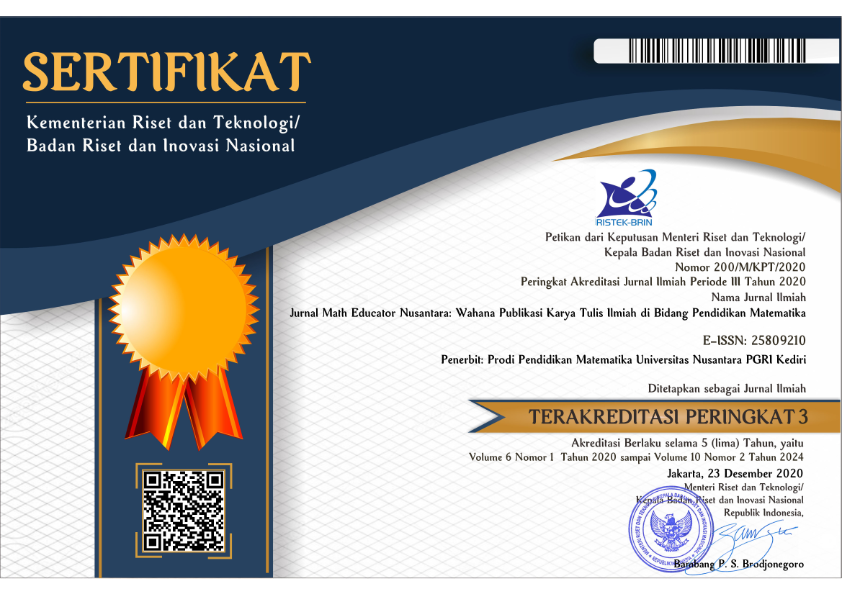Etnomatematika Dan Pemecahan Masalah Kombinatorik
Abstract
Abstrak : Penelitian ini bertujuan untuk membandingkan skor kemampuan pemecahan masalah Kombinatorik antara mahasiswa yang memperoleh perkuliahan dengan pendekatan etnomatematika dan pendekatan pembelajaran langsung. Penelitian ini termasuk jenis penelitian eksperimental semu dengan variabel bebasnya adalah pendekatan pembelajaran yang meliputi dua jenis yaitu pendekatan pembelajaran langsung dan pendekatan etnomatematika serta variabel terikatnya adalah skor kemampuan pemecahan masalah kombinatorik. Populasi dalam penelitian ini adalah seluruh mahasiswa semester VI Program Studi Pendidikan Matematika FKIP Universitas Veteran Bangun Nusantara Sukoharjo. Sampel penelitian diambil dengan menggunaan teknik cluster random sampling. Metode pengumpulan data dilakukan dengan metode tes yaitu tes pemecahan masalah kombinatorik. Uji hipotesis yang dilakukan adalah dengan uji beda rerata t-test. Uji hipotesis dilakukan dengan program PSPP. Hasil dari uji hipotesis menunjukkan bahwa mahasiswa yang memperoleh perkuliahan dengan pendekatan Etnomatematika memperoleh skor kemampuan pemecahan masalah yang lebih tinggi dari pada perkuliahan dengan pendekatan langsung.
Abstract : This study aims to compare the scores of problem-solving skills combinatories between students who obtained the lecture with the approach of etnomatematics and direct learning approach. This research is a quasi experimental research with independent variable is approach of learning which include direct learning approach and ethnomatematic approach and dependent variable is score of problem solving ability of combinatoric. The population in this research is all students of 6th grade of Mathematics Education Program FKIP Universitas Veteran Bangun Nusantara Sukoharjo. Research sample is taken by using cluster random sampling technique. Methods of data collection is done by the test method is a combinatoric problem solving test. Hypothesis test is done by using t-test average test. Hypothesis testing is done with PSPP program. The result of the hypothesis test shows that the students who get the lecture with the Ethnomatematic approach get the higher problem solving skills score than the lecture with the direct approach.
References
Fujiati dan Mastur, Z. 2014. Keefektifan Model Pogil Berbantuan Alat Peraga Berbasis Etnomatematika Terhadap Kemampuan Komunikasi Matematis, Unnes Journal of Mathematics Education. 3 (3 ): 174-180
Hariastuti, R. M. 2017. Permainan Tebak-Tebakan Buah Manggis: Sebuah Inovasi Pembelajaran Matematika Berbasis Etnomatematika. Jurnal Matematika dan Pendidikan Matematika, 2(1), 25–35
Kaselin, S, Waluya, B. 2013. Kemampuan Komunikasi Matematis Pada Pembelajaran Matematika dengan Strategi React Berbasis Etnomatematika. Jurnal Penelitian Pendidikan. 2(2): 121-127.
Kencanawaty, G dan Irawan, A. 2017. Penerapan Etnomatematika dalam Pembelajaran Matematika di Sekolah Berbasis Budaya. Ekuivalen, 27(2), 169-179
Mahendra, I. W. E. 2017. Project Based Learning Bermuatan Etnomatematika dalam Pembelajaran Matematika. JPI (Jurnal Pendidikan Indonesia), 6(1), 106–114.
Nofitasari, L., Mastur, Z., dan Mashuri. 2015. Keefektifan Model Pembelajaran Tutor Sebaya Bernuansa EtnomatematikaTerhadap Kemampuan Pemecahan Masalah Peserta Didik pada Materi Segiempat. Unnes Journal of Mathematics Education. 5(1): 54-61
Rachmawati I. 2012. Eksplorasi Etnomatematika Masyarakat Sidoarjo, E-Jurnal UNESA. 1(1)
Sariningsih, R., dan Kadarisma G. 2016. Meningkatkan Kemampuan Berpikir Kreatif Matematis dan Kemandirian Belajar Siswa SMP Melalui Pendekatan Saintifik berbasis Etnomatematika. Jurnal Ilmiah UPT P2M STKIP Siliwangi, 3(1): 53-56
Uloko, ES, dan Imoko B. 2007. Effect of Mathematics Teaching Approach and Gender on Students Achievement in Locus. Journal of National Association of Science. Humanities Education Research. 5(1) : 31-36
Sirate, F. S. 2012. Implementasi Etnomatematika dalam Pembelajaran Matematika pada Jenjang Pendidikan Sekolah Dasar. Lentera Pendidikan, 15(1): 41-54
Supriyani, Mastur, Z., & Sugiman. 2015. Keefektifan Model Pembelajaran Berbasis Etnomatematika terhadap Kemampuan Pemecahan Masalah Siswa Kelas VII. Unnes Journal of Mathematics Education, 4(2), 135–141.
Suwito, A., & Trapsilasiwi, D. 2016. Pengembangan model pembelajaran matematika SMP kelas VII berbasis kehidupan masyarakat JAWARA (Jawa dan Madura) di Kabupaten Jember. JIPM (Jurnal Ilmiah Pendidikan Matematika), 4(2), 79–84.
Wahyuni, A, Wedaring, A.A, dan Sani, B. 2013. Peran Etnomatematika dalam Membangun Krakter Bangsa, Makalah Seminar Nasional Matematika dan Pendidikan Matematika, Prosiding, Jurusan Pendidikan Matematika FMIPA UNY, Yogyakarta: UNY
Wahyuni, I. 2015. Eksplorasi Etnomatematika Masyarakat Sidoarjo. Fenomena (Jurnal Penelitian Islam Indonesia), 15(2), 225–238.
Wulandari, D.A, dan Budiarto, M.T. 2016. Profil Pemecahan Masalah Matematika Siswa SMP Kelas VIII ditinjau dari Tingkat Kecerdasan Emosional dan Kemampuan Matematika. Mathedunesa, Jurnal Ilmiah Pendidikan Matematika, 1(5) : 14-20
Authors who publish with this journal agree to the following terms:
1. Copyright on any article is retained by the author(s).
2. The author grants the journal, right of first publication with the work simultaneously licensed under a Creative Commons Attribution License that allows others to share the work with an acknowledgment of the work’s authorship and initial publication in this journal.
3. Authors are able to enter into separate, additional contractual arrangements for the non-exclusive distribution of the journal’s published version of the work (e.g., post it to an institutional repository or publish it in a book), with an acknowledgment of its initial publication in this journal.
4. Authors are permitted and encouraged to post their work online (e.g., in institutional repositories or on their website) prior to and during the submission process, as it can lead to productive exchanges, as well as earlier and greater citation of published work.
5. The article and any associated published material is distributed under the Creative Commons Attribution 4.0 Internasional License







